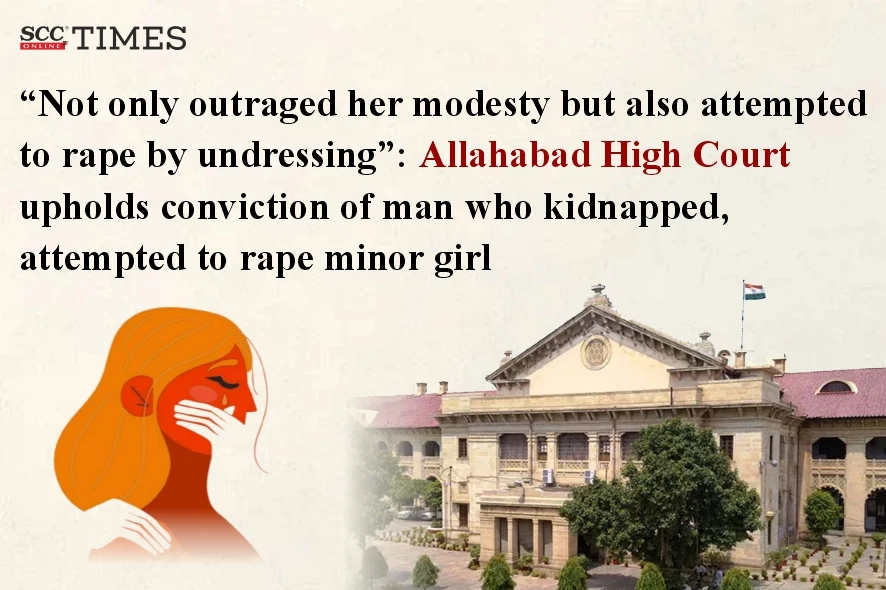Allahabad High Court: In a criminal appeal filed against the conviction and sentence awarded by the Trial Court to the convict under Sections 354, 363, 366, 376, and 511 of the Penal Code, 1860 (‘IPC’), the Single Judge Bench of Rajnish Kumar, J., rejected the appeal, holding that the prosecution had been able to prove that the convict forcibly kidnapped the victim and attempted to rape her by undressing her.
Background
In 2004, an FIR was lodged under Sections 363 and 366 of the IPC by the complainant stating that her daughter, the victim, aged 16 years, had been missing for the last 21 days. The complainant was searching for the victim when she found out that the convict had abducted her and had been missing too. The victim was recovered on the same day from the convict’s custody, and the convict was arrested.
As per the medical report, there were no injuries to the victim’s private parts, stomach, and thighs, but the hymen was torn, and the injury was old. No definite opinion could be given regarding rape.
Thereafter, the Trial Court convicted and sentenced the convict to rigorous imprisonment for 10 years with Rs. 5000 as fine under Section 376 read with Section 511 IPC, simple imprisonment for 7 years with Rs. 3000 as fine under Section 366 IPC, simple imprisonment for 5 years with Rs. 2000 as fine under Section 363 IPC, and simple imprisonment for 1 year with Rs. 1000 as fine under Section 354 IPC.
Analysis
At the outset, the Court perused the statements of the prosecution witnesses (‘PW’), especially the victim, who stated that she was on her way to the market when the accused approached her asking to go for a walk. When she refused, he forcibly took her in his vehicle despite her raising an alarm. Thereafter, he forcefully kept her in his relative’s house for 20 days and attempted to rape her, but she protested. Allegedly, he attempted to rape her twice by undressing her but could not penetrate. The Court noted that the victim’s evidence before the Trial Court supported this statement given by her under Section 164 of the Code of Criminal Procedure, 1973 (‘CrPC’). Thus, the Court held that the charges under Sections 363, 366, 376, read with 511 and 354 of the IPC had been proved.
The Court referred to Pandharinath v. State of Maharashtra (2009) 14 SCC 537, wherein it was held that if the accused had removed her clothes and he had not rebutted this statement of the prosecutrix in his examination-in-chief, it is a case of attempt to rape. The Court further referred to State of H.P. v. Shree Kant Shekari (2004) 8 SCC 153, wherein it was held that the question of consent is really a matter of defence by the accused, and it was for him to place materials to show that there was consent. It was also held that it is well settled that a prosecutrix complaining of having been a victim of rape stands at a higher pedestal than an injured witness and there is no rule of law that her testimony cannot be acted without corroboration in material particulars.
Regarding the present case, the Court found that the prosecution had proved that the victim was forcibly kidnapped by the convict to marry and have intercourse with her. He kept her at the residence of his relative for about 20 days with the said motive, where he not only outraged her modesty but also attempted to rape her by undressing her. However, he could not commit rape on account of her protest. The victim stated that the convict had done “bad work” with her. Additionally, nothing could be extracted from her in cross-examination, which might create any doubt on her version or about the veracity of her evidence.
Furthermore, the Court noted that the convict had attempted to establish a prior relationship with the victim by producing certain letters, which were denied by the victim, and no cogent material had been placed on record to prove the same.
Regarding the delay in registering the FIR, the Court stated that the delay in lodging the FIR had been explained properly in the FIR, and the delay is immaterial in such cases, particularly when the prosecution has proved its case. In this regard, the Court placed reliance on Satpal Singh v. State of Haryana (2010) 8 SCC 714, wherein the Court held that in sexual offences, the criteria may be different altogether. As honour of the family is involved, its members have to decide whether to take the matter to the Court or not. In such a situation, the near relations of the prosecutrix may take time to decide what course of action should be adopted. Thus, delay is bound to occur.
The Court further found that the plea of implication of the convict on the ground of enmity could not be proved by him, and no evidence could be adduced to prove any enmity.
Thus, the Court concurred with the impugned judgment and order, holding that the present appeal had been filed on misconceived and baseless grounds.
[Pradeep Kumar v. State of U.P., 2025 SCC OnLine All 3983, decided on 01-07-2025]
Advocates who appeared in this case :
For the Appellant: B.S. Patel
Amicus Curiae: Ashutosh Singh
For the Respondent: GA




